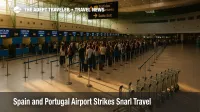Strikes in Portugal
Title: Strikes in Portugal: What Travelers Need to Know
Introduction
Strikes and labor disputes are an ongoing reality in many European countries, with Portugal being no exception. While these events demonstrate a healthy democracy where workers can voice their concerns, they may also disrupt the plans of tourists visiting the country. Strikes in Portugal can affect various sectors, including public transportation, aviation, and other service industries. To ensure a smooth journey in the country, travelers should always be informed about potential strikes and plan accordingly.
History and Background of Strikes in Portugal
Portugal has a long history of labor activism and workers' strikes. The most significant labor movement in the country happened in the 1960s and 1970s, culminating with the Carnation Revolution in 1974, which saw the fall of the authoritarian Estado Novo regime. Since then, the Portuguese labor movement has played a critical role in shaping the country's political and economic landscape.
The main labor unions in Portugal are the General Confederation of Portuguese Workers (CGTP) and the General Workers' Union (UGT). Both unions frequently organize strikes to address various labor concerns, such as wage increases, job security, working conditions, and pension reforms. Strikes generally aim to send a message to the government or employers to implement significant changes and improvements in workers' rights and conditions.
Impact of Strikes on Travelers
Strikes can significantly impact travelers' plans while visiting Portugal. The most affected sectors are usually public transportation (trains, buses, and metro), aviation (flight cancellations or delays), and, to a lesser extent, the hospitality industry. It's essential for travelers to be informed about any potential strikes during their visit and to adapt their plans accordingly.
Public Transportation Strikes
Public transportation strikes can disrupt travelers' plans in multiple ways. Travelers may find train, metro, and bus services operating with reduced timetables or completely suspended, causing difficulty getting around the cities and commuting between destinations. Strikes may also lead to chockful stations, as commuters and tourists alike flock to the few functioning transportation options.
During these disruptions, it is essential for visitors to stay informed about the strike developments and alternative transport options available. Travelers can consider using taxis or ridesharing services like Uber or Bolt. Alternatively, they can opt for private car rentals, rent bikes or scooters, or explore cities on foot.
It is worth noting that not all public transportation workers participate in every strike. So, there might be some services available even during strike periods. To know which lines are operational, travelers can check the websites and social media channels of the transport providers, such as Comboios de Portugal (CP) for trains or Carris for buses and trams in Lisbon.
Aviation Strikes
Strikes in the aviation sector can cause flight cancellations, delays, and long queues at the airport, directly affecting passengers' travel plans. These strikes may involve airline employees (e.g., pilots, flight attendants, or ground staff) or staff from the aviation infrastructure sector, such as air traffic controllers or airport workers.
During an aviation strike, travelers should be proactive in checking their flights' status by calling their airline or monitoring the airline's website and social media channels. Airlines often have the responsibility to provide alternative travel solutions or compensation to passengers affected by strike-related cancellations or delays. These provisions can be found in airlines' terms and conditions or in the European Union's "Air Passenger Rights."
In case of extensive disruptions, it's advisable for travelers to consider alternative modes of transportation, such as buses, trains, or rental cars, to reach their desired destination. Additionally, having travel insurance that covers strike-related issues can also help reduce the financial impact of itinerary changes.
Hospitality Industry Strikes
Strikes in the hospitality sector, such as hotel employees, are less common and usually have minimal direct impact on travelers. However, visitors might experience service quality issues due to reduced staffing numbers, such as delayed check-ins, limited housekeeping services, and fewer amenities. In such cases, travelers should be more patient and flexible, understanding that the situation is temporary and not the hotel's fault.
How to Stay Informed
To keep track of potential strikes and stay informed during their visit, travelers can:
- Monitor local news outlets for any reports of upcoming strikes. 2. Check websites of unions (CGTP and UGT), transportation providers (e.g., CP, Carris, and Metropolitano de Lisboa), and airlines for the latest updates. 3. Consult with their hotels, hostels, or local acquaintances about strike-related disruptions. 4. Follow social media channels of relevant organizations for live updates about strikes and relevant service adjustments.
Conclusion
Although strikes in Portugal can disrupt travelers' plans, being informed and prepared can help minimize inconvenience and ensure an enjoyable visit. With proper research and quick adaptation to available alternatives, tourists can continue exploring Portugal's beautiful landscapes, rich history, and diverse culture with minimal disruptions.
Europe Transport Strike Dates 2026 for Flights and Trains

Portugal Ground Handling Strike Called Off for New Year
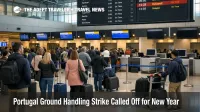
Portugal Airports Ground Handling Strike Dec 31 to Jan 1
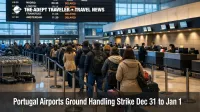
Portugal Ground Handling Strike Risks New Year Flights
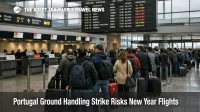
Portugal General Strike Cuts Flights And Trains Dec 11 2025
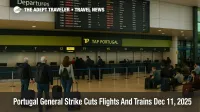
Portugal Strike Hits Lisbon Flights December 11
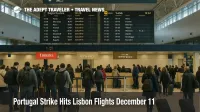
Portugal General Strike December 11 Hits Transport
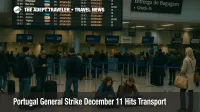
Portugal December 11 Strike To Disrupt Flights, Transit
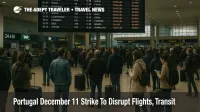
Portugal Airport Strikes To Disrupt Flights December 5 To 8
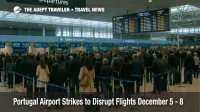
Portugal General Strike To Ground Most Flights December 11
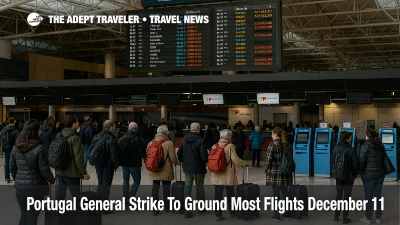
Portugal General Strike To Hit Flights December 11, 2025
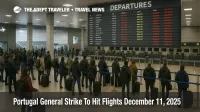
Portugal General Strike To Ground Flights December 11
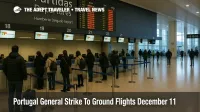
December Strikes Hit Europe, New Zealand Flights, Trains
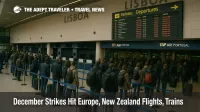
Portugal Ground Handling Strikes, Intermittent Delays
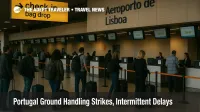
Portugal Rail Strike Trims Long-Distance Service Through November 13
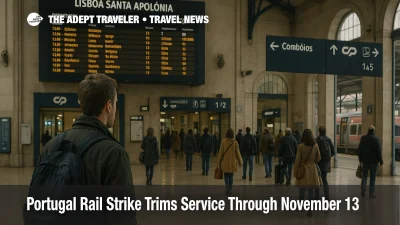
Lisbon Port Stoppage Nov 7-8 Disrupts Cruise Calls

Lisbon Port Strike Disrupts Calls And Embarkations

November Protest Watch: Budget Actions May Disrupt Travel

Lisbon Port Strike Triggers 48-Hour Cruise Changes
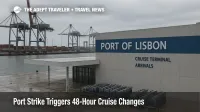
Portugal's Public-Sector Strike Slows Services

Lisbon Port Strike: Cruise Changes Through Friday

Portugal Port Strike Shifts Lisbon Cruise Calls Oct. 23-24

Portugal airport strikes, what is guaranteed this weekend
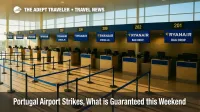
Portugal airport strike spans 76 days to January
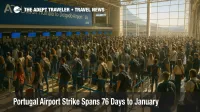
Spain and Portugal Airport Strikes Snarl Travel
